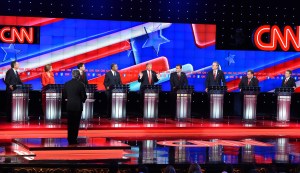A more lively Jeb Bush jabbed Donald Trump and the increasingly public rivalry between Marco Rubio and Ted Cruz spilled into the open Tuesday night during the final Republican presidential debate of the year.

Bush, the former Florida governor whose campaign is floundering, appeared eager to hit the GOP front-runner at the CNN debate and asserted himself more effectively than in previous debates. The two exchanged tense words on Trump’s plan to temporarily ban Muslims from entering the United States as well as his recent vow to go after family members of ISIS terrorists.
The latter, Bush said, was “another example of (Trump’s) lack of seriousness.”
Trump, visibly annoyed, at one point could be seen mouthing, “Give me a break.” He delivered his usual attack line on the ex-governor: that he is too nice.
“I think Jeb is a very nice person, very nice person,” Trump said. “But we need toughness.”
As Bush interjected, Trump taunted: “You’re trying to build up your energy but it’s not working.”
Bush shot back: “Donald, you’re not going to be able to insult your way to the presidency.”
Rubio and Cruz, meanwhile, tussled over a string of issues, including the National Security Agency’s surveillance program, immigration reform and how the United States should respond to dictators in the Middle East. Rubio blasted Cruz for voting for the USA Freedom Act — a law that makes it more difficult for the government to access people’s phone records.
“Here’s the world we live in. This is a radical jihadist group that is increasingly sophisticated,” said Rubio, who voted against the act. “We are at a time when we need more tools, not less tools.”
Cruz called Rubio’s accusation simply false, and said the law ultimately “strengthened the tools of national security and law enforcement to go after” terrorists.
The GOP debate came in the aftermath of deadly terror attacks that shook Paris and San Bernardino, California. Those events upended the narrative and focus of the 2016 presidential campaign, making national security a top-tier issue.
The stakes are higher than ever for the White House hopefuls, as they eye the Iowa caucuses now just seven weeks away and adjust to new political dynamics in the aftermath of ISIS-inspired terror attacks. The anxiety in the wake of those attacks was evident on Tuesday when public schools in Los Angeles took the unprecedented step of closing in response to what the superintendent called a “rare” threat.
Cruz and Rubio go at it
The long-running feud between the Cruz and Rubio has intensified as both men have risen in the polls and are seeking to seize the second-place spot after Trump. Cruz is attempting to straddle the line between being an outsider candidate and one who can appeal to the establishment. Rubio has tried to blunt Cruz’s rise by attacking his national security policy as too isolationist — a potent attack at a time when national security is dominating the campaign.
Cruz hit Rubio on one of the Florida senator’s biggest political vulnerabilities: Rubio’s work on the “Gang of Eight” comprehensive immigration reform bill. Calling the legislation a “massive amnesty plan,” Cruz accused Rubio of working with Democrats to give Obama a “blanket authority” to accept refugees.
“He was fighting to grant amnesty and not to secure the border. I was fighting to secure the border,” Cruz said.
Rubio hit back, saying Cruz supports the legalization of people who are in the country illegally. He also slammed his colleague for supporting a controversial H-1B visa program, which supports immigration of highly skilled foreign workers.
Cruz and Rubio also split on whether the turmoil in the Middle East would ease if Syrian President Bashar al-Assad was removed from power.
“If we topple Assad, the result will be ISIS will take over Syria and it will worsen U.S. national security interests,” Cruz said.
Rubio rejected this notion, saying while the United States must sometimes work with “less than ideal governments,” Assad was simply an “anti-American dictator.”
‘Undercard’ debate
Trump also was criticized during an earlier so-called “undercard” debate. Four lower-polling White House hopefuls kicked off the evening by raising alarm about the threat of radical Islam — and went after Trump for the Muslim proposal.
“You may think this makes us safe, but it doesn’t,” said South Carolina Sen. Lindsey Graham, one of Trump’s most vocal critics. “Donald Trump has done the one single thing you cannot do — declare war on Islam itself.”
Former Pennsylvania Sen. Rick Santorum said it’s “not the right proposal.”
But Santorum blasted a culture of political correctness that he faults for blunting debate over the role of Muslims in society.
“Not all Muslims are jihadists,” he said. “All jihadists are Muslim.”
Santorum and Graham — who dominated the discussion — were joined by former Arkansas Gov. Mike Huckabee and former New York Gov. George Pataki. All four are at risk of being next on the chopping block if they’re unable to gain real momentum soon.
On stage at the Venetian theater, Trump was flanked by Cruz, the Texas senator whose poll numbers are on the upswing; and Ben Carson, the retired neurosurgeon whose political standing has been damaged by a series of gaffes.
Cruz is now threatening Trump’s monthslong front-runner status in Iowa, with polls showing the senator either neck-and-neck with or ahead of Trump in the state. But the candidate has shown little appetite for publicly engaging Trump.
Trump remains the undisputed national GOP presidential front-runner. A Monmouth University poll on Monday placed him at 41%, the first time he’s cracked the 40% threshold in a national survey. A poll from The Washington Post and ABC News conducted entirely after Trump proposed the Muslim ban found support for Trump at 38% of Republicans and Republican-leaning independents — up six percentage points from a Post/ABC poll in mid-November.













